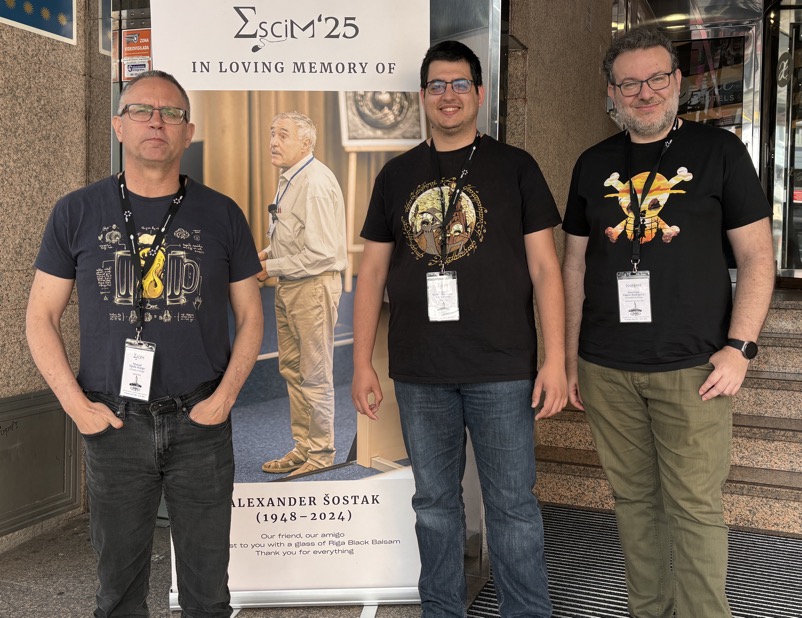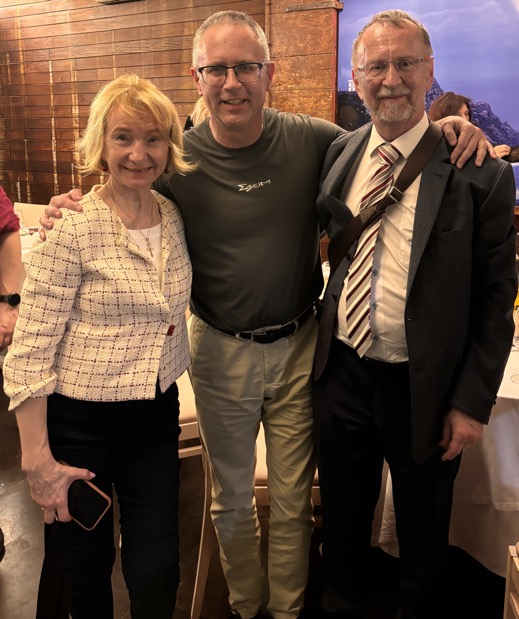Journal paper accepted MATHEMATICS
12/06/25/11:03 Filed in: Journal paper
C. Díaz-Montarroso, N. Madrid, E. Ramírez-Poussa. Correctness of Fuzzy Inference Systems Based on f-Inclusion. Mathematics 2025, 13, 1897.
ABSTRACT Recent work has shown that the f -index of inclusion can serve as a foundation for modeling Generalized Modus Ponens. In this paper, we develop a novel fuzzy inference system based on this inference rule. To establish its soundness, we connect it to a Fuzzy Description Logic LU enriched with fuzzy modifiers (also known as fuzzy hedges). This logic background provides to the approach a strength absent in most fuzzy inference systems in the literature, which allows us to formally prove a series of results that culminate in a final correctness theorem for the proposed fuzzy inference system. This paper also presents a running example aimed at showing the potential applicability of the proposal.
ABSTRACT Recent work has shown that the f -index of inclusion can serve as a foundation for modeling Generalized Modus Ponens. In this paper, we develop a novel fuzzy inference system based on this inference rule. To establish its soundness, we connect it to a Fuzzy Description Logic LU enriched with fuzzy modifiers (also known as fuzzy hedges). This logic background provides to the approach a strength absent in most fuzzy inference systems in the literature, which allows us to formally prove a series of results that culminate in a final correctness theorem for the proposed fuzzy inference system. This paper also presents a running example aimed at showing the potential applicability of the proposal.
Conference papers accepted EUSFLAT
27/05/25/13:02 Filed in: Conference paper
N. Madrid, M. Ojeda-Aciego. Studying the structure generated by subsets of ƒ-indexes of inclusion.14th Conference of the European Society for Fuzzy Logic and Technology, Riga, 2025.
Key-Work Abstract The ƒ-index of inclusion has proven to be a suitable generalization of the inclusion in the fuzzy setting. In this paper, the properties of the ƒ-index of inclusion, when its definition is restricted to a subset of indexes, are analyzed. The theoretical results obtained in this work are necessary in order to develop fuzzy inference systems based on the ƒ-index of inclusion.
M. Holcapek, N. Cao, R. Valasek, N. Madrid, T. Tichy, D. Nedela. Weighted Quantile Approach to Time Series Forecasting Using Fuzzy-Probabilistic Inference Systems.14th Conference of the European Society for Fuzzy Logic and Technology, Riga, 2025.
Contributed Paper Abstract
M. Ojeda-Hernández, D. López Rodríguez. On direct systems of implications with graded attributes. 14th Conference of the European Society for Fuzzy Logic and Technology, Riga, 2025.
Contributed Paper Abstract In this paper the problem of defining direct systems of implications in the fuzzy setting is studied. The directness of systems allows a quick computation of the closure operator in cases such as Fuzzy Formal Concept Analysis. Characterizing these properties in algebraic terms is deeply linked to Simplification Logic. After the theoretical results, some thoughts on algorithms to provide direct systems are also considered.
Key-Work Abstract The ƒ-index of inclusion has proven to be a suitable generalization of the inclusion in the fuzzy setting. In this paper, the properties of the ƒ-index of inclusion, when its definition is restricted to a subset of indexes, are analyzed. The theoretical results obtained in this work are necessary in order to develop fuzzy inference systems based on the ƒ-index of inclusion.
M. Holcapek, N. Cao, R. Valasek, N. Madrid, T. Tichy, D. Nedela. Weighted Quantile Approach to Time Series Forecasting Using Fuzzy-Probabilistic Inference Systems.14th Conference of the European Society for Fuzzy Logic and Technology, Riga, 2025.
Contributed Paper Abstract
M. Ojeda-Hernández, D. López Rodríguez. On direct systems of implications with graded attributes. 14th Conference of the European Society for Fuzzy Logic and Technology, Riga, 2025.
Contributed Paper Abstract In this paper the problem of defining direct systems of implications in the fuzzy setting is studied. The directness of systems allows a quick computation of the closure operator in cases such as Fuzzy Formal Concept Analysis. Characterizing these properties in algebraic terms is deeply linked to Simplification Logic. After the theoretical results, some thoughts on algorithms to provide direct systems are also considered.
Participation ESCIM'25
26/05/25/11:21 Filed in: Conference participation
European Symposium on Computational Intelligence and Mathematics, ESCIM, Coruña, Spain, May 18-21, 2025
A well-attended conference in which our team presented two keyworks and one position paper. The titles of the talks were "Composition as a fuzzy conjunction between indexes of inclusion", "New simplification rules for databases with positive and negative attributes" and "Unfiltered Large Language Models: Forensic and Legal Challenges of their Criminal Use on the Dark Web: a preliminary study".
We had the opportunity to meet again a number of colleagues, Vilém Novák, Vladik Kreinovich, László Koczy, Francesc Esteva, Juan Moreno, and Jesús Medina among others, in order to discuss prospects of future work or continue the existing ones. In the picture, our team members and after de gala dinner with Irina Perfilieva (external member) and Vilém Novák.


Journal paper accepted KBS
23/04/25/11:48 Filed in: Journal paper
D. López, M. Ojeda-Hernández, T. Pattison. Systems of implications obtained using the Carve decomposition of a formal context. Knowledge-based systems, 318:113475, 2025.
ABSTRACT The Carve algorithm uses a divide-and-conquer strategy to compute the concept lattice of a formal context. The decomposition phase of the Carve algorithm discovers hierarchical structure in an amenable formal context, which the synthesis phase then exploits to construct the concept lattice from those of the component sub-contexts. In this paper, the problem of computing a sound and complete set of attribute implications via a refinement of the Carve decomposition is studied. Indeed, a set of rules is devised to obtain a set of valid implications which is proved to be complete. The refined decomposition and these rules are implemented in the novel Carve+ algorithm, whose runtime compares favorably with direct computation of the Duquenne–Guigues base of implications via the NextClosure algorithm.
ABSTRACT The Carve algorithm uses a divide-and-conquer strategy to compute the concept lattice of a formal context. The decomposition phase of the Carve algorithm discovers hierarchical structure in an amenable formal context, which the synthesis phase then exploits to construct the concept lattice from those of the component sub-contexts. In this paper, the problem of computing a sound and complete set of attribute implications via a refinement of the Carve decomposition is studied. Indeed, a set of rules is devised to obtain a set of valid implications which is proved to be complete. The refined decomposition and these rules are implemented in the novel Carve+ algorithm, whose runtime compares favorably with direct computation of the Duquenne–Guigues base of implications via the NextClosure algorithm.
Journal paper accepted: IJAR
10/03/25/10:26 Filed in: Journal paper
H.J. Bello, M. Ojeda-Hernández, D. López-Rodríguez, C. Bejines. Fuzzy time series analysis: Expanding the scope with fuzzy numbers. Int. J. of Approximate Reasoning 180:Article 109387, 2025.
ABSTRACT This article delves into the process of fuzzifying time series, which entails converting a conventional time series into a time-indexed sequence of fuzzy numbers. The focus lies on the well-established practice of fuzzifying time series when a predefined degree of uncertainty is known, employing fuzzy numbers to quantify volatility or vagueness. To address practical challenges associated with volatility or vagueness quantification, we introduce the concept of informed time series. An algorithm is proposed to derive fuzzy time series, and findings include the examination of structural breaks within the realm of fuzzy time series. Additionally, this article underscores the significance of employing topological tools in the analysis of fuzzy time series, accentuating the role of these tools in extracting insights and unraveling intricate relationships within the data.
ABSTRACT This article delves into the process of fuzzifying time series, which entails converting a conventional time series into a time-indexed sequence of fuzzy numbers. The focus lies on the well-established practice of fuzzifying time series when a predefined degree of uncertainty is known, employing fuzzy numbers to quantify volatility or vagueness. To address practical challenges associated with volatility or vagueness quantification, we introduce the concept of informed time series. An algorithm is proposed to derive fuzzy time series, and findings include the examination of structural breaks within the realm of fuzzy time series. Additionally, this article underscores the significance of employing topological tools in the analysis of fuzzy time series, accentuating the role of these tools in extracting insights and unraveling intricate relationships within the data.
Journal paper accepted: IJAR
25/02/25/10:31 Filed in: Journal paper
Francisco Pérez-Gámez, Carlos Bejines. An exploration of weak Heyting algebras: Characterization and properties. International Journal of Approximate Reasoning, 179: Article 109365, 2025.
ABSTRACT This paper explores weak Heyting algebras, an extension of complete Heyting algebras, focusing on characterizing this concept and identifying essential properties in terms of implication operators. The main emphasis is on unraveling the defining features and significance of the novel weak Heyting algebras. We further classify these structures within the context of a complete lattice and extend our findings to the Cartesian product. We facilitate comprehensive comparisons among these structures, by contributing to the broader understanding of weak Heyting algebras in mathematical research.
ABSTRACT This paper explores weak Heyting algebras, an extension of complete Heyting algebras, focusing on characterizing this concept and identifying essential properties in terms of implication operators. The main emphasis is on unraveling the defining features and significance of the novel weak Heyting algebras. We further classify these structures within the context of a complete lattice and extend our findings to the Cartesian product. We facilitate comprehensive comparisons among these structures, by contributing to the broader understanding of weak Heyting algebras in mathematical research.
Journal paper accepted: MMAS
05/02/25/13:34 Filed in: Journal paper
N. Madrid and M. Ojeda-Aciego. On the φ-index of inclusion: studying the structure generated by a subset of indexes. Mathematical Methods in the Applied Sciences, 2025.
ABSTRACT The φ-index of inclusion has proven to be a suitable generalization of the inclusion in the fuzzy setting. In this paper, the properties of the φ-index of inclusion, when its definition is restricted to a subset of indexes, are analyzed. The theoretical results obtained in this work are necessary in order to develop fuzzy inference systems based on the φ-index of inclusion.
ABSTRACT The φ-index of inclusion has proven to be a suitable generalization of the inclusion in the fuzzy setting. In this paper, the properties of the φ-index of inclusion, when its definition is restricted to a subset of indexes, are analyzed. The theoretical results obtained in this work are necessary in order to develop fuzzy inference systems based on the φ-index of inclusion.
Journal paper accepted: NEUCOMP
07/01/25/12:00 Filed in: Journal paper
I. Perfilieva, N. Madrid, M. Ojeda-Aciego, P. Artiemjew, A. Niemczynowicz. A Critical Analysis of the Theoretical Framework of the Extreme Learning Machine. Neurocomputing, 2025
ABSTRACT Despite several successful applications of the Extreme Learning Machine (ELM) as a new neural network training method that combines random selection with deterministic computation, we show that some fundamental principles of ELM lack a rigorous mathematical basis. In particular, we refute the proofs of two fundamental claims and construct datasets that serve as counterexamples to the ELM algorithm. Finally, we provide alternative claims to the basic principles that justify the effectiveness of ELM in some theoretical cases.
Journal paper accepted: MATHS
01/01/25/10:47 Filed in: Journal paper
D. López-Rodríguez, M. Ojeda-Hernández, and C. Bejines. New Simplification Rules for Databases with Positive and Negative Attributes. Mathematics 13.2 (2025). ABSTRACT In this paper, new logical equivalences are presented within the simplification logic with mixed attributes paradigm, which allow the obtention of bases of shorter, easier-to-read attribute implications. In addition to the theoretical results which show that the proposed equivalences indeed hold in simplification logic with mixed attributes, experimental results which showcase the effectiveness of this method are also provided. Furthermore, the simplification method presented is iterative and gives sufficiently good results in only one or two iterations, therefore presenting itself as a reasonable procedure in time-sensitive experiments.
